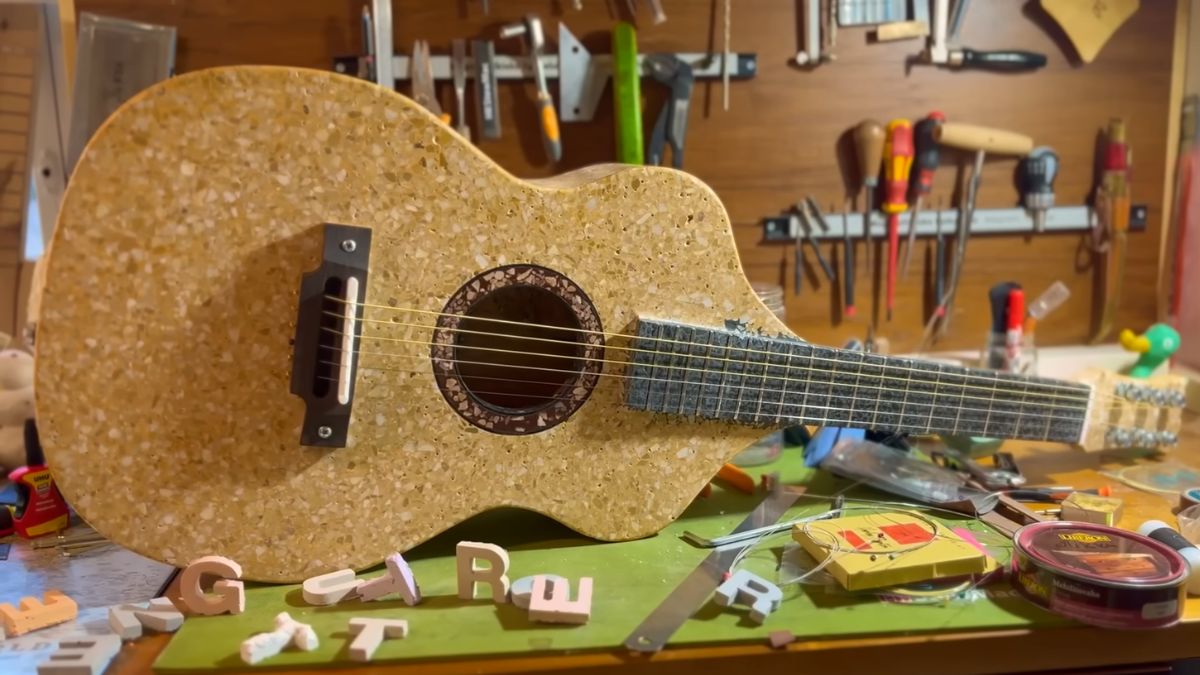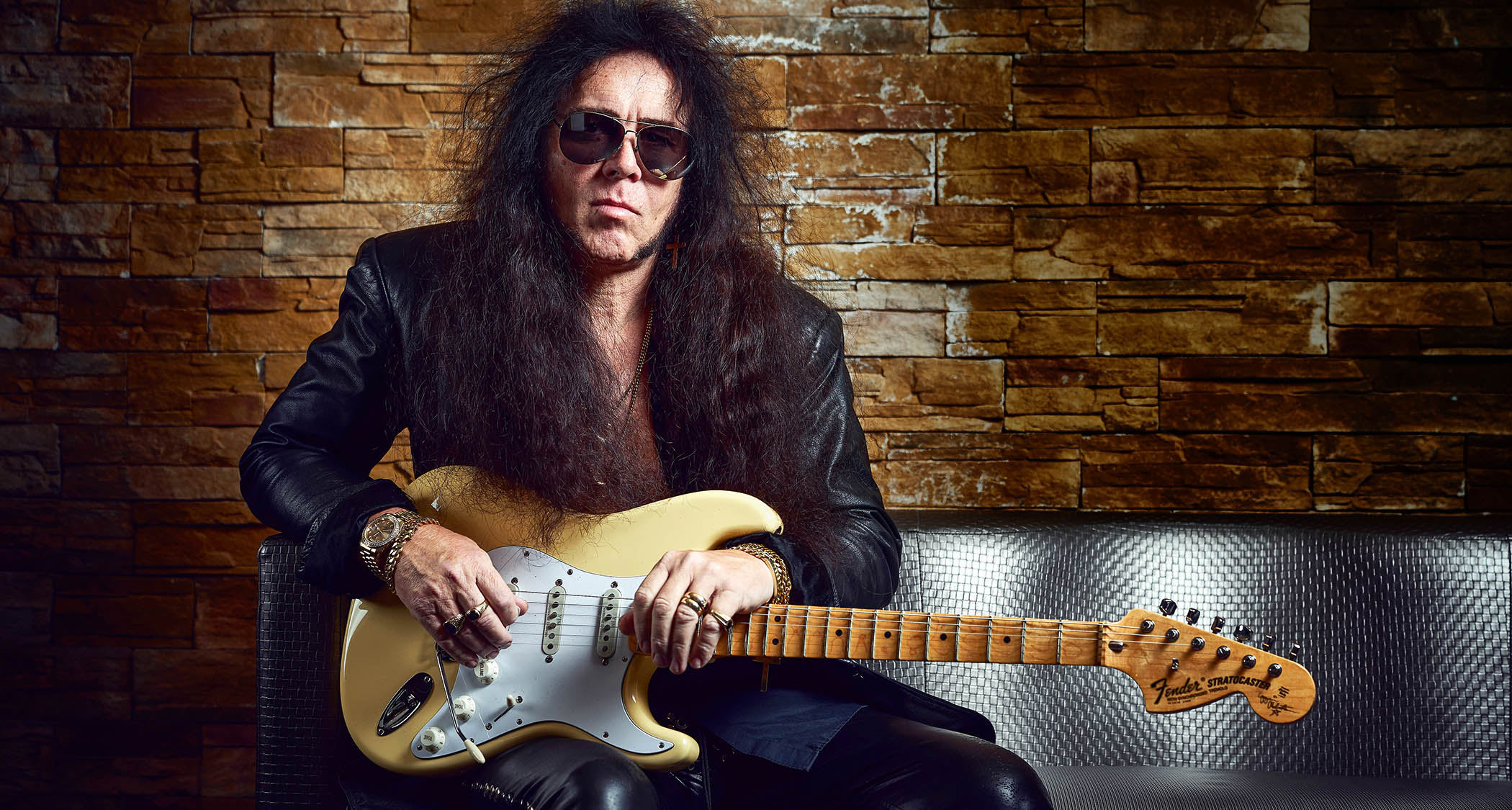Jake E. Lee Discusses Red Dragon Cartel's Moody New Album, 'Patina,' Possible Tour with Zakk Wylde
"It was recorded pretty much like we did in the old days." The former Ozzy axeman tells GW how he revisited the bluesy style of his Badlands days on his new LP with Red Dragon Cartel.
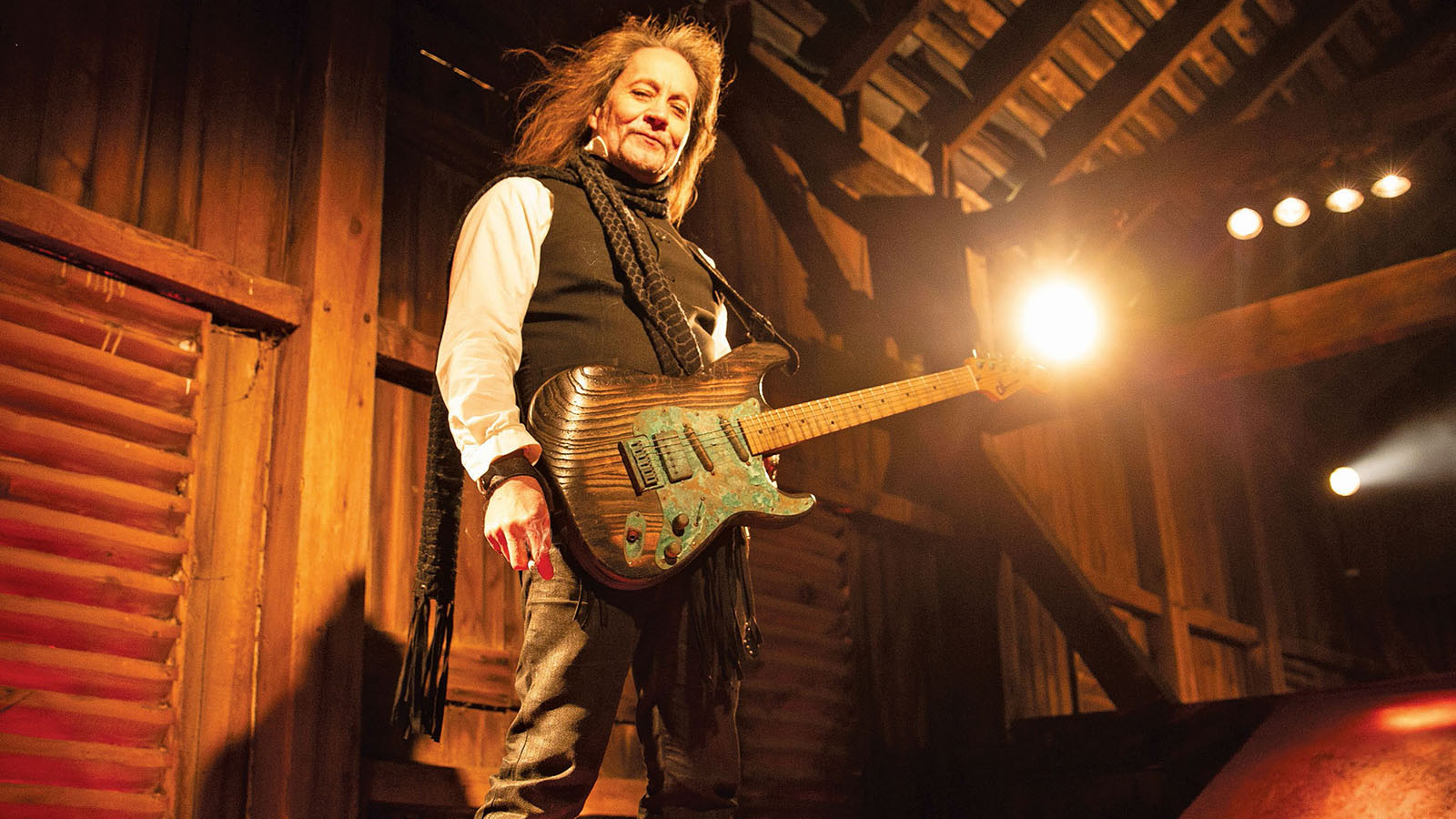
It all started when Jake E. Lee had a good reason for naming the new album from his band, Red Dragon Cartel, Patina. “I liked the word because it refers to something that’s weathered and aged and actually looks cooler because of it,” the 61-year-old guitarist says.
“And so I thought it was applicable to me. Because I’d like to think I look cooler as I’m getting older.” Lee laughs. “Although I’m sure there’s a lot of people that would disagree!”
Looks, of course, are in the eye of the beholder. But is Jake E. Lee getting better with age? Quite possibly. Patina is his second album with Red Dragon Cartel, the band he put together after a hiatus from the music business that spanned roughly two decades. Prior to retreating from the spotlight, Lee made a name for himself as one of hard rock’s premiere shredders, first with Ozzy Osbourne, with whom he played from 1983 to 1987, and then with his own blues-rock outfit, Badlands.
When he reemerged on the scene in 2014 with the hard-rocking Red Dragon Cartel, he received a hero’s welcome from fans that revere his hot-wire licks and solos on Ozzy albums like Bark at the Moon and The Ultimate Sin. But Patina finds Lee delving more heavily into the bluesy style reminiscent of his Badlands days, complete with groove-oriented riffs and solos that rely more on hooky melodic themes than note-y pyrotechnics.
“I’m pretty happy with all the solos on this record,” Lee says. “They’re a little more melodic and well thought-out than in the past. I didn’t resort to just playing fast when I didn’t have any ideas. And the band recorded everything together on a ranch in Pennsylvania, where we were able to hang out and jam and come up with material really naturally. So that added to the vibe.”
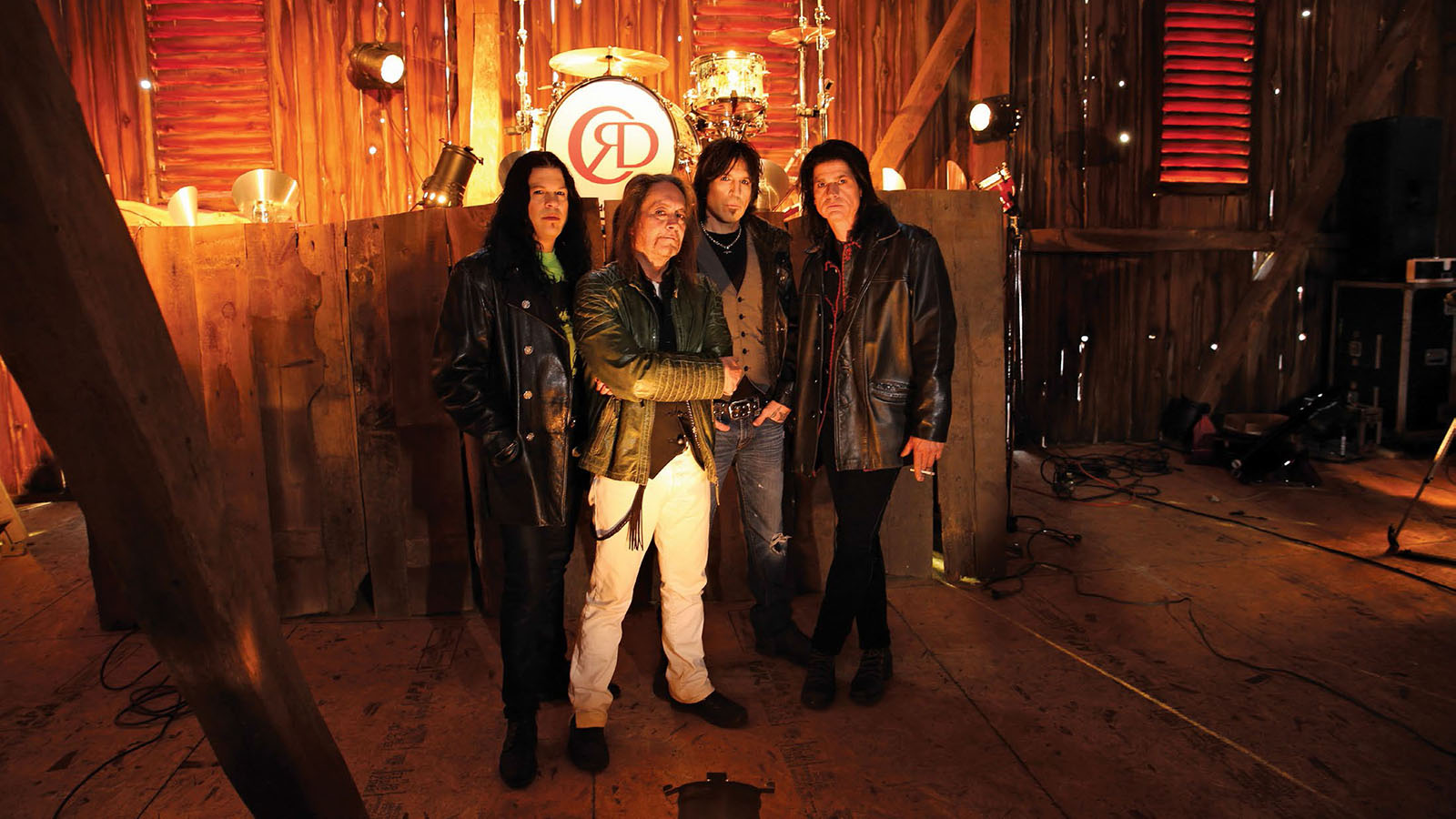
The result is a new-and-improved Red Dragon Cartel, which also includes in its lineup singer Darren Smith, ex-Lynch Mob bassist Anthony Esposito and ex-Saigon Kick and Skid Row drummer Phil Varone. Now two albums in with his new band, Lee is looking forward to once again getting out on the road and sharing his music with fans. And in keeping with the title Patina, he says that he’s been away long enough that he’s no longer “out of date.” He laughs again. “Now I’m…classic!”
Patina is a more bluesy affair than the first Red Dragon Cartel record. Would you agree?
Get The Pick Newsletter
All the latest guitar news, interviews, lessons, reviews, deals and more, direct to your inbox!
Yeah, that sounds about right. Part of the reason for that is because this one was done more organically. The songs were written with everybody in the room, and then it was recorded pretty much like we did in the old days. So it just has that vibe to it. The other thing is that the last time we recorded with [producer] Kevin Churko, and his production is a little more modern-sounding. But this one I think comes across sounding more like a product of an old geezer like me. [laughs] There’s more flavors. One song, there’s even a little bit that kind of sounds like Dick Dale.
What song is that?
Oh, boy…let me think of the name of the song, because all of them had joke titles until we actually wrote lyrics, and those are the titles I still know them by. It’s the last song on the record — “Ink and Water.” It starts with the bass, and then I do, to the best of my abilities, these little jazzy sorts of flourishes. And then it goes into a surf kind of a thing. But I’ve always liked to try to throw as many flavors as I can into the pot. I used to do that in Badlands. I really didn’t do it very much with Ozzy.
For most of your career you’ve been put into a box as a “shredder.” But this new album is definitely not a shred album. There’s a lot of great guitar playing on it, but the solos are more reliant on melodies and themes, or even odd sounds, as opposed to just cramming as many notes as possible into a bar of music.
I never adhered to that whole shredder thing. I know some people put me in that category, but I never considered myself one. And I don’t think there’s anything wrong with shredders. It’s not that I don’t want to be there, it’s just that some people, their playing is more of a stream of consciousness — sort of like John Coltrane, where they play a bunch of notes and can say something with it — and I never really thought I was that kind of a player. Although I did used to play faster more often. But for this record in particular, I wanted to make every note count. And Tyler Esposito, who is [bassist] Anthony’s son, he was the recording engineer on the album and he has a really good ear for things. He wouldn’t let me get away with just playing fast because I didn’t have anything else to do. So I’d play something in the studio, and then I’d come into the control room and I could always tell by the way he looked at me — he’d be like, “Really? That’s what you’re going to do for that solo? Play a bunch of notes?” And he would make me go back out until I came up with something worthwhile.
One song that has a really great solo is “Crooked Man.” There’s also a nice blend of electric and acoustic guitars on it.
I like that one a lot. It’s got that quirky riff in it and then it goes into a very acoustic-flavored bridge, which is unusual for me because I don’t even own an acoustic! I’ve never owned an acoustic. I don’t like acoustic guitars. [laughs] The thing that drew me to the guitar was Jimi Hendrix and the whole growl and ferocity of the electric, and you don’t get that with acoustic. So I’ve never owned an acoustic. Whenever I need one I just borrow it. And the one I used on this album was a nice one — a Fifties or early-Sixties Martin.
Another interesting one is “Chasing Ghosts.” It gets almost proggy in the solo section, don’t you think?
Yeah. That one used to be called “Chode Strangler.” I really have to get used to these real titles…
“Chode Strangler?” Where did that name come from?
Well, let me see… why was it called “Chode Strangler”? Oh — because I wanted to get a vibe kind of like [Ted Nugent’s] “Stranglehold.” [laughs] It doesn’t really come across that way, but that’s how it started. I liked that title, though I don’t know what we would have made the lyrics about. Well, I have an idea of what we could have made the lyrics about, but I don’t know if that’s really something I’d want to be associated with! But that was a strange one. The chorus softens up from the verse, which is kind of the opposite of what choruses usually do. And then it goes into an odd time signature thing, kind of like the Police or something. And there’s a weird solo in there. So there’s a lot of cool parts.
What was your main guitar and amp setup on Patina?
The main amp that made it through at least 60, 70 percent of the record was an old Marshall 50-watt from the Seventies that belonged to Anthony. And there were some other heads — a Silvertone, a 1969 Laney, a Voodoo, a Fender Twin. But the bulk of the record was the Marshall.
What about guitars?
There was no one guitar, really. I have a friend down in Florida who has a pretty large guitar collection, and he drove a bunch of them up to the studio for me to use. I can’t remember everything, but I know there was a ’52 Tele and a ’68 Tele, a ’57 Strat, a ’63 Strat and a ’69 Les Paul. I also used a ’56 Gretsch and my ’68 SG. I had a lot of guitars to choose from, which is not the way I’ve ever done it in the past. Usually I’ll pick a guitar and amp I like and just go.
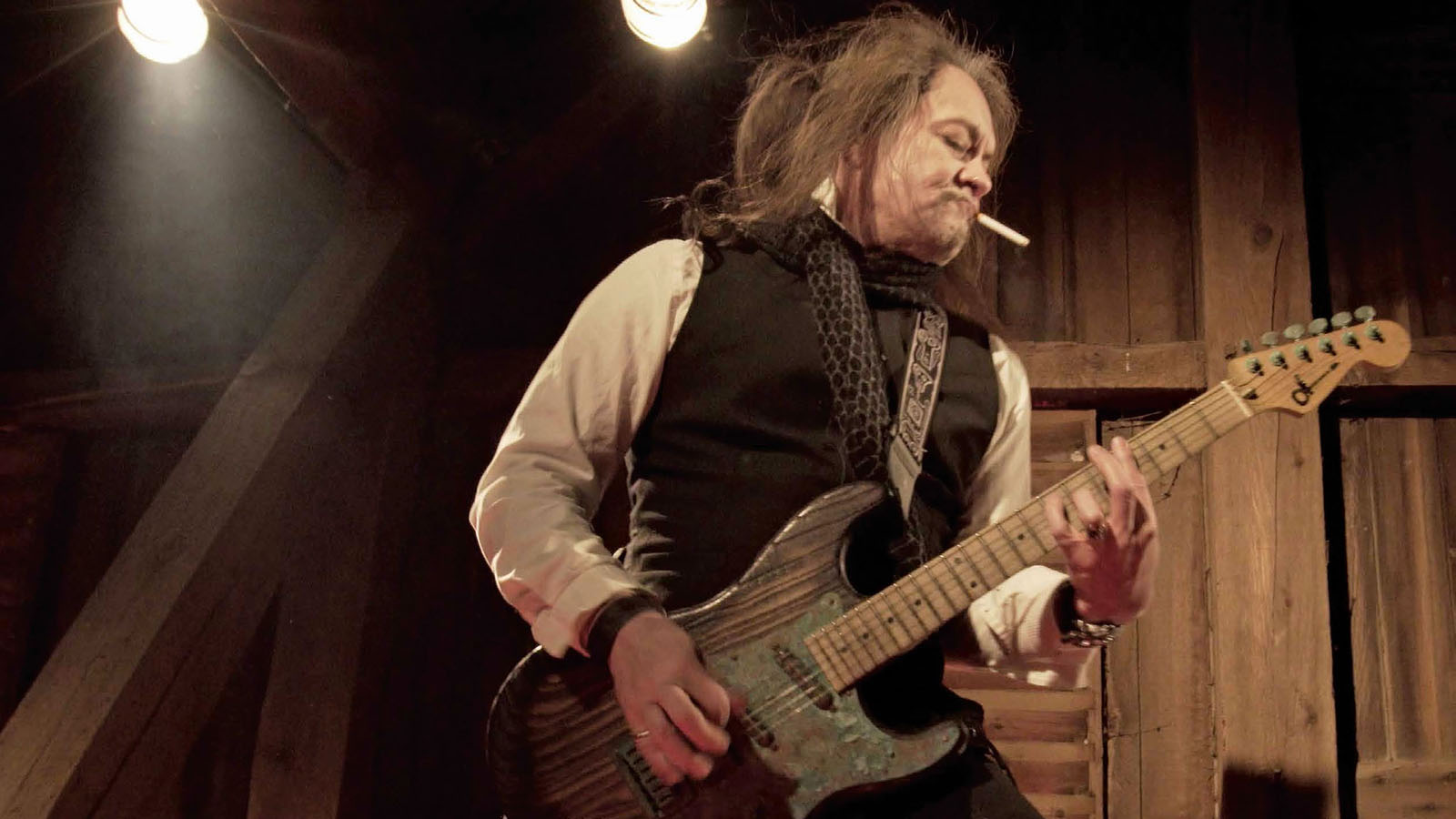
Did you use your Charvel signature model at all?
I did, on “Ink and Water.” I do some tap harmonics in the chorus, and I used that guitar specifically. It’s not really too high in the mix, but it’s there.
What about pedals?
Well, my buddy that brought me all the guitars also had probably close to 100 pedals, all old vintage ones. So I had a lot to choose from. If I wanted, say, a chorus, there’d be 12 choruses for me to try. And there were some great old ones, like a Boss CE-1, the one you have to actually plug into the wall. I remember I used that a lot. There was also a Roland Funny Cat, a lot of bizarre old pedals.
Are you planning to do a full-scale tour behind Patina?
I am. I don’t think there’s any firm commitments yet other than I know we’re going to Japan in April, and we’ll probably do an American tour before that. Other than that, nothing else is actually set. We’ll probably be doing bars and clubs, although we were hoping to go out on tour with somebody — ideally we wanted to do something with Zakk Wylde, because I just think that would be really cool to have two Ozzy guitar players together.
Fans would love a double bill like that. Was the idea ever broached with Zakk’s camp?
I think it was, with his management. Because I don’t know Zakk personally. I only met him once and that was when he was 19 — back when he was skinny and pretty, you know? [laughs] But it’s been a long time since I’ve actually talked to Zakk.
That one time you met him, was he already playing with Ozzy?
Yeah. It was right after he got the gig. We were at some hotel in L.A., I can’t think of the name, for a Badlands meeting. And Ozzy walked by. And then Zakk walked by and he introduced himself. And he was really cool. I mean, I had nothing against him.
Did you guys chat at all? Was there any advice you offered him about the Ozzy gig?
I mean, I had just gotten fired. What kind of advice could I give? [laughs]
“Don’t get fired.”
[laughs] No, I didn’t give any advice. I just wished him luck. It was a very brief meeting. But he seemed like a nice guy and he’s always been very kind to me in the press.
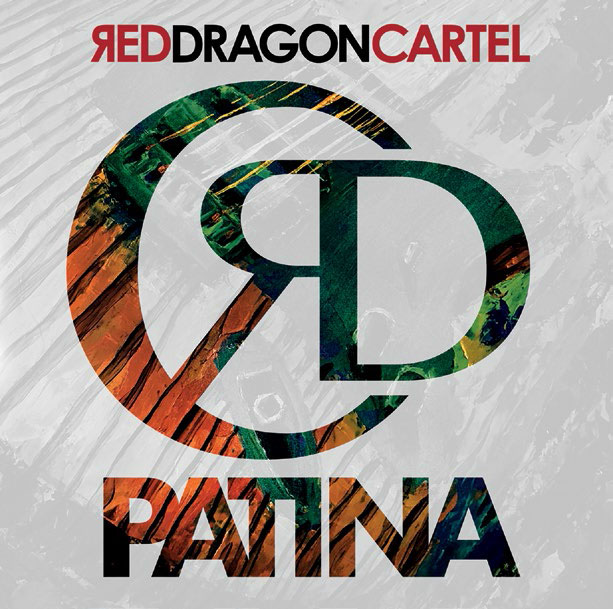
The tour for the last Red Dragon Cartel was your first time doing extensive road work in decades. How did it feel?
The actual performing part was easy. I like playing live and I didn’t have any problems with that. The traveling part, my body doesn’t weather it as well anymore. About 10, 11 years ago I broke my back, and around the same time I shattered my heel. I don’t want to sound like a whiner, but the traveling part is definitely harder. But the performing? That’s no problem. Getting up onstage and playing music, that still feels natural.
You spent a lot of years outside of the music industry. Now that you’re back, does this world feel comfortable to you? Or do you feel like a fish out of water?
It’s really a bit of both. It’s not the same world, that’s for sure. And I’m not saying that as a good thing or a bad thing. But like I said, this record was made like I would have made it back in the Eighties and Nineties, and I don’t know how many people would do it that way anymore. It’s so much easier just to do it the way I did the first Red Dragon Cartel record, which was to piece it all together in the studio. But I don’t know if it’s so much that I feel out of place as it is that I know what my place is and I’m not trying to change it. And also, I don’t care. At this point in my life I just do things the way I want to do them. And if it works, it works. If it doesn’t, it doesn’t. Either way, it’s no skin off my back.
Rich is the co-author of the best-selling Nöthin' But a Good Time: The Uncensored History of the '80s Hard Rock Explosion. He is also a recording and performing musician, and a former editor of Guitar World magazine and executive editor of Guitar Aficionado magazine. He has authored several additional books, among them Kurt Cobain: Montage of Heck, the companion to the documentary of the same name.

